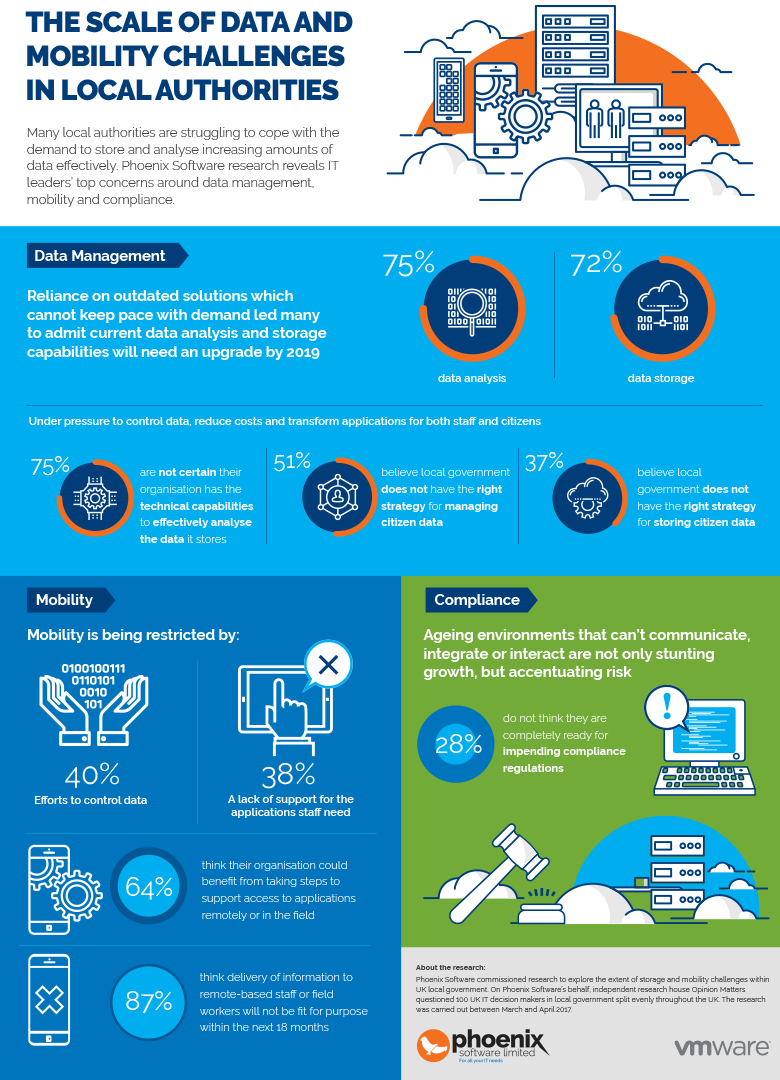Why local government needs to invest in the right technology today to meet the data challenges of tomorrow.

By Keith Martin, Director of Public Sector, Phoenix Software
Local government is tasked with perhaps the most thankless and hardest of missions – to offer the best services to citizens, while budgets are continually slashed. Despite this conundrum, citizens expect their local authorities to continue to do more with less.
To do that, they need a clear strategy. However, our research proves that this isn’t necessarily the case.
What are local government in the UK saying?
We asked 100 IT leaders in local government across the UK how well equipped they were with regards to data storage and analysis, mobility and the delivery of information and services to citizens – all key aspects of technology that underpin a successful modernisation strategy. We found IT decision makers thought changes should be made to their capabilities in these areas by 2019:
- 75 percent believe the current data analysis capabilities in their organisation will be unfit for purpose within the next 18 months.
- 72 percent believe the current data storage capabilities in their organisation will be unfit for purpose within the next 18 months.
- While controlling data flow across the organisation is a top challenge for 36 percent, many would like to see a strategic change in their organisation (51 percent) for managing citizen data.
- There’s an opportunity for local authorities to change the way they serve up information and services to both citizens and staff. Many believe more up-to-date technology could be implemented to help staff (32 percent) or citizens (19 percent).
- More specifically, there’s a large majority (87 percent) that would like to see IT application support for remote workers or field-based staff – and nearly two thirds (63 percent) believe delivery of information to these remote staff will not be fit for purpose within the next 18 months.
A race against time for IT heads
It’s clear a number of local authorities are due an upgrade – but of more concern is that IT heads don’t believe they will get to that place in 12 to 18 months.
Perhaps dwindling finances have left chief executives apprehensive about modernising their technology and processes and about the budget they’re giving to their CIO. They need to embrace change and cease investment in outdated technologies so that they can focus on funding initiatives that best support their future. New technology can actually help them save money, increase productivity and ultimately improve the services they provide. But the budgetary constraints are just one part of the problem.
Ultimately, there is no single area where local governments can apportion blame for being unprepared – there are several factors in play at once. But there’s no doubt that without the budget required it is harder to recruit, retain and train staff, and harder to procure technology. Without all of these ingredients it is harder for a Chief Executive to back an IT leaders’ strategy. It becomes a vicious circle.
How can local government futureproof investment in technology?
This is why IT leaders need to think of innovative ways to provide the capabilities necessary, particularly when the three areas the research looked (data, mobility and applications) are set to be crucial to local government’s ability to meet citizens’ expectations.
From a data perspective, proactive use of data to develop and roll out services will have to grow quickly to more effectively run everything – from managing bed allocation in hospitals, to social worker visits for citizen engagement.
For mobility, applications have to enable staff to make informed decisions at strategically important times, while also being mobilised for citizens, empowering them to access services in ways more convenient to flexible, modern lifestyles.
And with much of today’s innovation centred around applications, local authorities need to implement a robust cloud strategy that works now, while also future-proofing investment in technology to ensure it also meets the demands faced in years to come.
Local authorities need to make a call for change now – or they may struggle in the years ahead to deliver the services that citizens are demanding as the costs of keeping outdated technologies intact cripples the organisation’s finances.
Want to know more?







